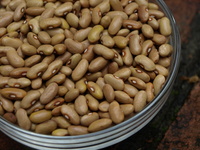The Weblog

Athens Locally Grown has closed.
Availability for January 21
To Contact Us
Athens Locally Grown
athens.locallygrown.net
On Twitter: @athlocallygrown
Recipes
Curried Winter Squash Soup
Late in the season, when the sun seems never to shine, and the winds come, and it’s cold, the farm kitchen smells of this soup. It’s filling, and it warms the soul on days when the last thing you want to do is to be outside prepping the fields for next year. From Farmer John’s Cookbook: The Real Dirt On Vegetables.
Serves 6 to 8
3 tablespoons unsalted butter
1 cup chopped scallions (about 6 scallions)
1/4 cup chopped fresh parsley
1 jalapeno pepper, seeded, finely chopped (about 1 tablespoon)
2 cloves garlic, minced (about 1 teaspoon)
2 pounds butternut squash (about 1/2 large squash), peeled, seeded, cubed
4 cups chicken or vegetable stock
1 14-ounce can whole tomatoes, chopped, or 2 cups peeled, chopped fresh tomatoes
12 whole fresh curry leaves (optional)
1/2 teaspoon ground allspice
1/4 teaspoon ground mace
pinch freshly grated nutmeg
2 teaspoons curry powder
salt
freshly ground black pepper
1/4 cup chopped fresh parsley
1. Melt the butter in a large saucepan over medium heat. Add the scallions; sauté until soft and wilted, about 3 minutes. Stir in the parsley, jalapeno, and garlic; cook, stirring occasionally, for 5 minutes.
2. Add the squash and toss to coat it with the scallion mixture. Add the stock, tomatoes, curry leaves, allspice, mace, and nutmeg. Bring to a boil; reduce the heat and simmer, covered, until the squash is very tender, about 45 minutes. Let cool slightly.
3. Transfer the soup in batches to a blender or food processor; puree.
4. Transfer the soup back to the pot. Stir in the curry powder and add salt and pepper to taste. Return the soup to a simmer to heat through. Garnish with parsley just before serving.
Market News
In the past two weeks I’ve talked about the legal organization and considerations behind our market and then the financial operation that keeps everything running. I’ll wrap up my yearly primer on Athens Locally Grown this week with a few words about our growers and other market vendors.
First and foremost, let me preface everything by saying the decision to let a new grower into the market is always made by me alone. I know the Saturday Athens Farmers Market got some press this year regarding one vendor in particular feeling left out of the market and complains that the committee running that market was a little too closed. Well, my efforts to run ALG in a cooperative manner aside, the responsibility here comes back to me. There’s no committee, and no formal application process. That doesn’t mean we don’t have standards, of course, and actually I think I’ve set the bar pretty high. A good number of our growers also go above and beyond to only bring “the best of the best”, and that pushes the standards even higher. I’ve never put them down on paper, but here’s a summary:
- All growers must use sustainable practices and never use synthetic fertilizers or pesticides. I’ll come back to this later.
- All growers can only sell what they themselves have grown
- All growers must be from the greater Athens area. Right now, this means within about 75 miles
- All animals raised for meat or eggs must be pastured
- Handicrafts must be made primarily from items produced or gathered on the farm
- Prepared foods must use organic ingredients if at all possible, and locally grown ingredients if at all possible
- All proper licenses, when required by law, must be obtained
That about covers everything, I think. When I’ve turned down requests to sell through ALG (and I have turned down many), the items clearly broke one or more of those standards. There are a few edge cases that I take on a case by case basis. Coffee is one. 1000 Faces was our first coffee vendor, and they offered direct trade coffees (they purchased directly from the coffee growers with no distributor or middle man) and did all the roasting and packaging themselves and to order. That set the standard, and other coffee vendors (such as GranCoffee Roasting Co.) have to match it. Mills Farm was a founding ALG member, but they buy in organic grains for their mill. We now have Sylvan Falls Mill in Rabun Gap as a vendor, and they buy all their grains from local (to them) organic growers. From now on, all future millers wanting to sell through ALG will have to meet that standard. And so on.
 |
 |
 |
Let me get back to that first requirement: “sustainable practices”. There’s no set definition of that, and there’s really a sliding scale. For example, I sometimes use a gasoline-powered rototiller, and both the no-till growers and the no-hydrocarbon growers would frown upon that. There is a generally accepted definition of what is “conventional” agriculture, and that includes the use of synthetic fertilizers and pesticides, and confined and grain-fed animals. Those are easy to exclude. At the other end, there is the USDA Organic Certification and Certified Naturally Grown certification. Few small diversified growers can meet the expense of USDA certification, but a good number of our growers are CNG certified. This program uses the USDA rules as a starting point, made a few things more strict, and uses a system of growers certifying other growers to keep things honest. My farm has been CNG certified for eight years, and many others area farms have followed since then. If a new grower does not have a certification, then I talk to them, get information about them, and visit their farm in person when necessary. A good number of our growers were ALG customers long before growing for market themselves, so I’ve gotten to know the people and the decision to let them in was easy.
In short: the growers have satisfied my standards, and I personally have approved them for inclusion in ALG. However, I want you to not just take my word for it. We have monthly farm tours during the warm seasons so you can go on-site yourself and see the farms in action. We have a semi-regular “meet the grower” table at the Thursday pickups so you can talk with the growers yourself face-to-face. We encourage them to take photos for their online photo album, to describe their practices, and to take care with their product listings. We want to facilitate communication between you and them, so when you place an order, they see your name and email address in case they need to clarify a request or offer a substitution, and likewise for most of our growers you can see their contact info when you view their grower profile (while logged into the site) so you can get clarification from them when needed.
Hopefully that explains how our growers get into ALG, what standards they have to meet, and so on. It’s a very important topic, perhaps the most important one for our market, but much of it goes on behind the scenes. I know you’ve put your trust in me, and I take that very seriously, I’ll be in Chattanooga this week for the annual Southern Sustainable Agriculture Working Group conference, but if you’d like to talk with me in person in future weeks about this or any other aspects of ALG, I’d love to do so. Just pull me aside when you come by to pick up your order.
Now, onto the food! The week of freezing temps has done a number on our availability. We’re down to a mere 501 products listed this week. Still, the leafy greens will bounce back quickly, and I see lots of sun in the coming weather forecast. So, hopefully this current lull will be a short-term thing.
Thanks so much for your support of Athens Locally Grown, all of our growers, local food, and our rights to eat it. You all are part of what makes Athens such a great area in which to live. We’ll see you on Thursday at Ben’s Bikes at the corner of Pope and Broad Streets from 4:30 to 8pm!
Coming Events
We’re starting to put a plan together on how best to use the space at Ben’s Bikes when the weather warms up and we really fill the back room. The first thing we want to tackle is the parking/walking space outside. The rain really did a number on the soil, and to make things worse the last storm took out one of those huge pecan trees behind the building. The heavy equipment needed to cut the thing up turned a large area of the lot to mud. We want to spread some gravel back there. Do any of you know of a source of free or cheap gravel that we can get delivered to the lot there? We can spread it around, but if the deliverer is able to do that too, so much the better. ALG depends on volunteer labor, so we don’t have much funds for this sort of thing. If you know of anyone who can help with this, please let me know.
We’re also making plans for an awning to give us more working space outdoors. We’ll put out a call for workers when it’s time to build that.
The Athens Farmers Market has closed for the winter. You can watch for news during the offseason on their website. The other area markets are also all closed for the season too. All but Athens Locally Grown, that is.
Please support your local farmers and food producers, where ever you’re able to do so!
We thank you for your interest and support of our efforts to bring you the healthiest, the freshest and the most delicious locally-produced foods possible!